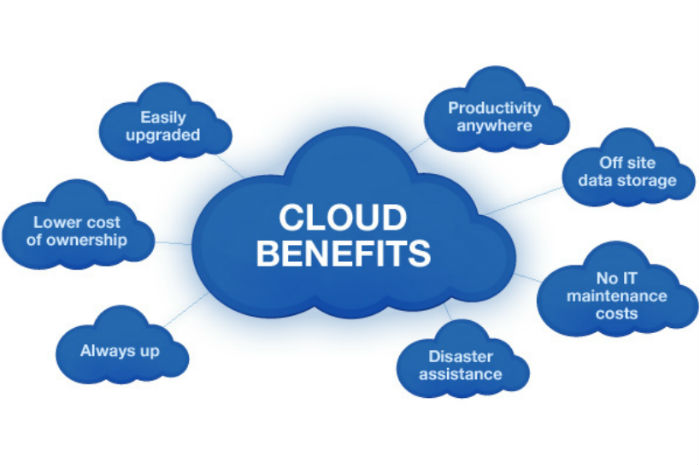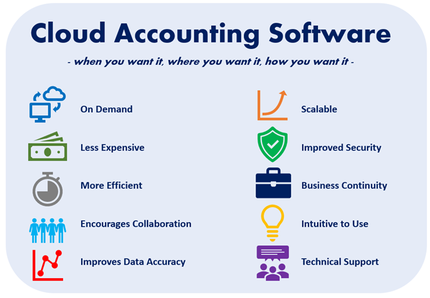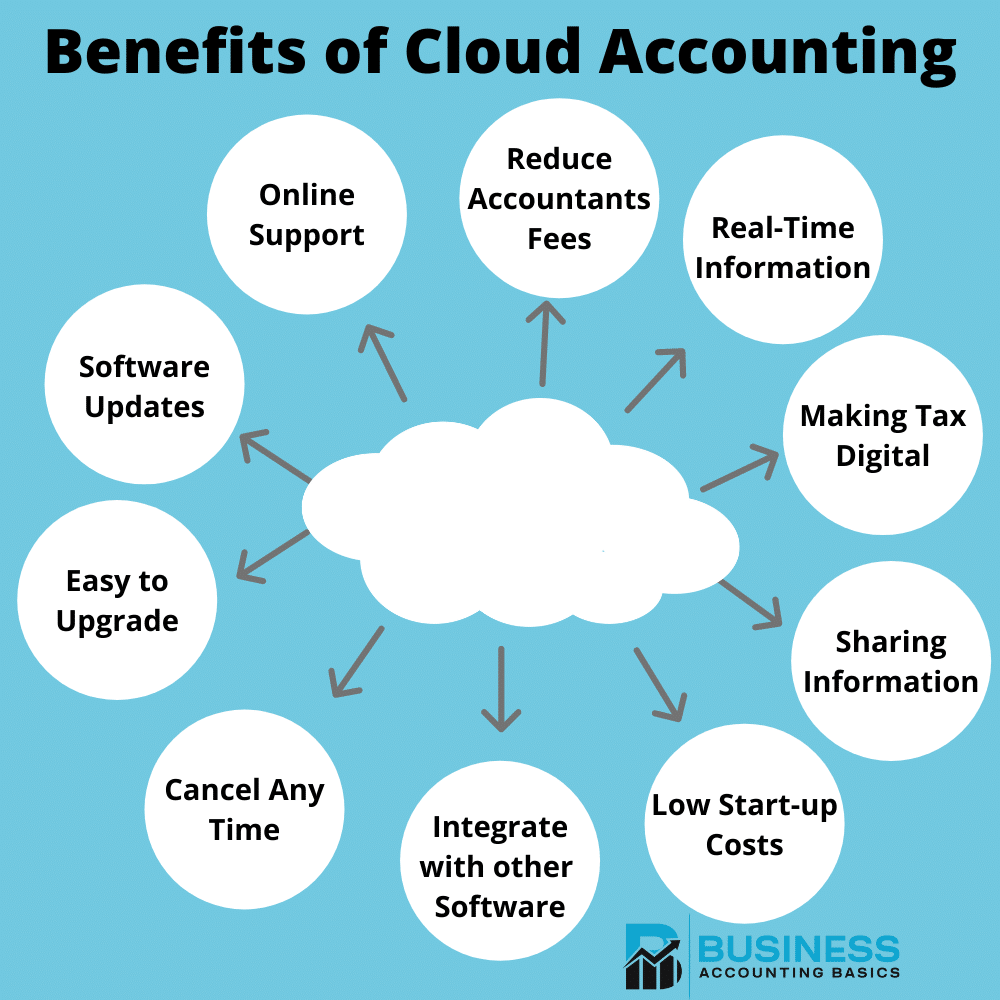Cloud accounting has revolutionized the way businesses manage their finances. It offers numerous advantages that traditional accounting systems simply can’t match.
In today’s fast-paced digital world, staying on top of your financial data is crucial. Cloud accounting allows you to access your financial information from anywhere, at any time. This flexibility is essential for business owners who are always on the go. Additionally, it provides real-time updates, ensuring that you always have the most current financial data at your fingertips. With enhanced security measures, cloud accounting also protects your sensitive information from unauthorized access. Embracing cloud accounting can streamline your financial processes, saving you time and money, and allowing you to focus on growing your business. Discover the many benefits of cloud accounting and how it can transform your financial management. Explore more about cloud accounting and its advantages by visiting our recommended accounting software at https://affpolicy.com/.
Introduction To Cloud Accounting
Cloud accounting is transforming how businesses handle their finances. It offers flexibility, accessibility, and real-time data access. This section covers what cloud accounting is and its numerous benefits.
What Is Cloud Accounting?
Cloud accounting refers to using online software for financial and accounting tasks. Unlike traditional software, cloud accounting is accessible via the internet, eliminating the need for physical installations.
Key features include:
- Online access from anywhere
- Automatic software updates
- Enhanced data security
- Real-time financial reporting
Purpose And Benefits Of Cloud Accounting
The primary purpose of cloud accounting is to streamline financial management. It helps businesses maintain up-to-date financial records without manual interventions.
Benefits include:
| Benefit | Description |
|---|---|
| Accessibility | Access financial data from any location with internet. |
| Cost-Effective | Reduces costs associated with traditional software. |
| Security | High-level encryption protects sensitive data. |
| Real-Time Updates | Provides instant updates and reports. |
| Scalability | Grows with your business needs. |
Cloud accounting makes financial management simpler and more efficient. Businesses can focus on growth while ensuring their financial data is accurate and secure.

Credit: www.smartcloud.ie
Key Features Of Cloud Accounting
Cloud accounting software offers numerous advantages for businesses of all sizes. By leveraging cloud technology, companies can streamline financial processes, enhance security, and scale operations efficiently. Below are some key features that make cloud accounting a valuable tool for modern businesses.
Real-time Financial Data Access
With cloud accounting, you get instant access to financial data. This means you can view up-to-date financial information from anywhere, at any time. Real-time data access ensures that you can make informed decisions quickly, improving the overall efficiency of your business operations.
| Feature | Benefit |
|---|---|
| Instant Updates | Always have the latest financial data |
| Remote Access | Access data from any device |
Automation Of Financial Processes
Cloud accounting automates many tedious financial tasks. This includes automatic invoicing, expense tracking, and reconciliation. Automation reduces errors and saves time, allowing your team to focus on more strategic activities. It also ensures that financial records are consistently accurate and up-to-date.
- Automatic Invoicing
- Expense Tracking
- Reconciliation
Scalability And Flexibility
One of the major advantages of cloud accounting is its scalability. Whether your business is growing or going through seasonal changes, cloud solutions can easily adapt. You can add or remove users, integrate new features, and adjust storage capacity without significant downtime.
- Easy User Management
- Adjustable Storage
- Integration with Other Tools
Enhanced Security Measures
Security is a top concern for any business dealing with sensitive financial data. Cloud accounting platforms offer enhanced security measures to protect your information. This includes data encryption, regular backups, and secure user authentication. With these measures in place, you can be confident that your financial data is safe from unauthorized access and cyber threats.
Key security features include:
- Data Encryption
- Regular Backups
- Secure User Authentication
Pricing And Affordability
Cloud accounting solutions offer various pricing structures, making them accessible to businesses of all sizes. They provide cost-effective options that can cater to the budget constraints of small and medium businesses. Let’s explore the pricing and affordability aspects in detail.
Subscription-based Models
Most cloud accounting software uses a subscription-based model. This means you pay a monthly or annual fee for access to the software. This model eliminates the need for large upfront investments in software licenses and hardware.
Here’s a look at the typical pricing tiers available:
| Plan | Monthly Price | Features |
|---|---|---|
| Basic Plan | $6.39 | 5-10 slots, 2GB RAM, 30 days duration |
| Standard Plan | $12.79 | 20+ slots, 4GB RAM, 30 days duration |
| Premium Plan | $16.79 | 30+ slots, 6GB RAM, 30 days duration |
These plans offer different features, allowing businesses to choose the one that best suits their needs.
Cost-effectiveness For Small And Medium Businesses
Cloud accounting is particularly beneficial for small and medium businesses (SMBs) due to its cost-effectiveness. Traditional accounting software often requires a significant initial investment, but cloud solutions spread the cost over time.
Here are some benefits of cloud accounting for SMBs:
- Lower Initial Costs: No need to purchase expensive software or hardware.
- Scalability: Easily upgrade or downgrade your plan as your business grows.
- Maintenance-Free: The service provider handles updates and maintenance.
- Access Anywhere: Manage your accounts from any device with internet access.
These advantages make cloud accounting an ideal choice for SMBs looking to manage their finances efficiently without breaking the bank.

Credit: www.theaspteam.com
Pros And Cons Of Cloud Accounting
Understanding the advantages and potential drawbacks of cloud accounting is crucial for businesses. This section will help you weigh the benefits and considerations of adopting cloud-based accounting solutions.
Advantages Of Cloud Accounting
- Accessibility: Access your financial data from anywhere, at any time.
- Cost-Effective: Reduce the need for physical storage and IT infrastructure.
- Real-Time Updates: Obtain real-time financial reporting and analytics.
- Scalability: Easily scale your accounting solutions as your business grows.
- Collaboration: Collaborate with your team and accountants in real-time.
- Security: Benefit from advanced security measures and automatic backups.
Potential Drawbacks And Considerations
While cloud accounting offers many benefits, there are some potential drawbacks and considerations to keep in mind:
- Internet Dependency: Requires a stable internet connection for access.
- Data Privacy: Concerns about data privacy and security in the cloud.
- Subscription Costs: Ongoing subscription costs may add up over time.
- Learning Curve: Adapting to new software can require training and time.
- Vendor Reliability: Dependence on the service provider for uptime and support.
By weighing these pros and cons, businesses can make informed decisions about integrating cloud accounting into their operations.
Ideal Users And Scenarios
Cloud accounting software, like Godlike.Host, offers a range of benefits tailored to various users. Whether you’re running a small business, freelancing, or managing a large corporation, cloud accounting can streamline your financial tasks. Let’s explore who can benefit the most from cloud accounting solutions and in which scenarios they shine.
Small Business Owners
Small business owners often juggle multiple roles, from marketing to managing finances. Cloud accounting software provides an efficient solution to handle their financial needs. Here are some advantages:
- Accessibility: Access financial data from anywhere, at any time.
- Cost-Effective: No need for expensive hardware or IT support.
- Real-Time Updates: Keep track of finances with real-time data.
- Collaboration: Easily share financial data with accountants or team members.
For small business owners, the ability to manage finances on-the-go is invaluable. It ensures they stay on top of their financial health without being tied to an office.
Freelancers And Independent Contractors
Freelancers and independent contractors often have unique financial challenges. Managing invoices, tracking expenses, and preparing for tax season can be overwhelming. Cloud accounting software offers solutions tailored to these needs:
- Simplified Invoicing: Create and send invoices quickly and professionally.
- Expense Tracking: Easily track and categorize expenses for tax purposes.
- Time Management: Spend less time on bookkeeping and more on billable work.
- Mobile Access: Manage finances from any device, whether at home or on the go.
For freelancers, the flexibility and ease of use make cloud accounting an essential tool for managing their business finances effectively.
Large Enterprises And Corporations
Large enterprises and corporations have complex financial structures that require robust solutions. Cloud accounting software offers several features to meet these needs:
- Scalability: Easily handle large volumes of transactions and data.
- Advanced Reporting: Generate detailed financial reports for better decision-making.
- Security: Top-notch security measures to protect sensitive financial data.
- Integration: Seamlessly integrate with other enterprise systems and software.
For large enterprises, the ability to scale and integrate with existing systems makes cloud accounting an ideal choice for managing complex financial operations.

Credit: www.businessaccountingbasics.co.uk
Frequently Asked Questions
What Are The Benefits Of Cloud-based Accounting?
Cloud-based accounting offers real-time access, cost savings, scalability, automatic updates, and enhanced security. It simplifies collaboration and improves efficiency.
What Are The 5 Advantages Of Cloud Computing?
Cloud computing offers cost savings, scalability, disaster recovery, remote collaboration, and enhanced security. Enjoy flexibility and efficiency.
What Are The Drawbacks Of Cloud Accounting?
Cloud accounting drawbacks include security risks, potential data loss, internet dependency, limited customization, and potential higher long-term costs.
What Is One Benefit Of Cloud-based Payroll Accounting?
One benefit of cloud-based payroll accounting is real-time access to payroll data from anywhere, enhancing flexibility and efficiency.
Conclusion
Embracing cloud accounting offers many advantages for businesses. It enhances efficiency and accuracy. The real-time data access supports better decision-making. Automation reduces manual errors and saves time. Scalability ensures your accounting system grows with your business. Plus, enhanced security protects sensitive financial data. By switching to cloud accounting, you streamline operations and gain competitive edge. To explore more about software solutions, check out Godlike Minecraft Server Hosting. It offers high-performance hosting with excellent support.





